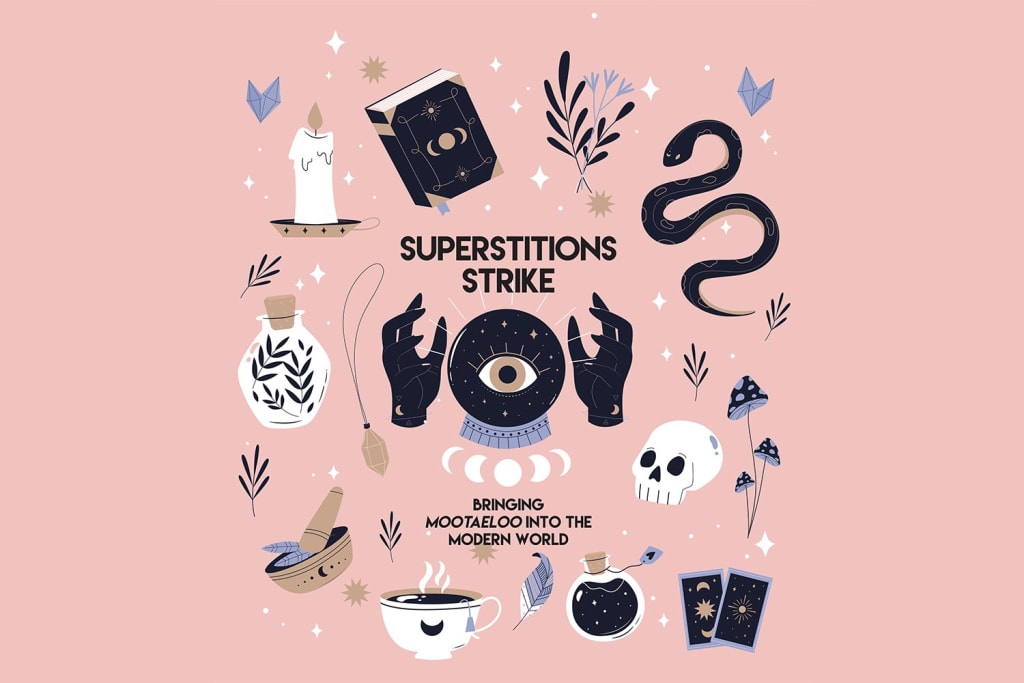Superstitions
Impact on Individual Lives and Prevalence Across Regions

Throughout history, superstitions have played a prominent role in societies worldwide due to their deep-rooted origins and cultural significance. From simple actions like knocking on wood to avoiding certain numbers or walking under ladders, these beliefs encompass various practices that are often seen as harmless or even comical. These beliefs and rituals, deeply rooted in ancient customs and cultural traditions, serve as a fascinating phenomenon worthy of exploration. Though seemingly innocuous or comical to some observers, superstitions exert a significant influence on the lives of countless individuals worldwide. This article endeavors to delve into the essence of superstitions by investigating their psychological ramifications and prevalence within diverse geographical contexts. In order to grasp this captivating facet of human behavior, scholarly insights from experts in various fields will be employed.
Superstitions encompass irrational convictions or customs that arise from individuals' longing for dominance over unpredictable occurrences. Although these beliefs often lack logical reasoning and scientific evidence, they persistSuperstitions are characterized as irrational beliefs or practices that arise from the human longing to manipulate or impact unpredictable occurrences. Frequently, they lack any rationality or scientific foundation but persist due to cultural transmission, tradition, and reinforcement through personal stories. Notwithstanding advancements in science and technology, superstitions endure, providing insight into humanity's profound psychological inclinations. Based on the research by psychologist Stuart Vyse in his book "Believing in Magic: The Psychology of Superstition," these convictions furnish individuals with a feeling of authority over their surroundings and help mitigate anxiety induced by uncertain circumstances.
Superstitions exert a strong impact on an individual's life, shaping their conduct, decision-making processes, and overall state of being. A prominent psychological mechanism at play in this phenomenon is known as "illusory correlation." The impact of superstitious beliefs on an individual's life can be significant, manifesting itself in various aspects such as behavior, decision-making processes, and overall well-being. A prominent psychological mechanism that underlies this phenomenon is known as "illusory correlation," which was first elucidated by psychologist Thomas Gilovich and his colleagues in their seminal work titled "Illusion of Control." Essentially, individuals are prone to developing a false perception of control over events they cannot actually influence when they associate a specific action or ritual with favorable outcomes. To illustrate this point further, consider the scenario where an individual performs a ritual before taking an important exam and subsequently attains success; they may falsely attribute their achievement to the efficacy of the ritual itself.
Superstitions can also have an impact on performance, particularly in situations where there is high pressure. According to research conducted by Damisch et al. and published in Psychological Science, individuals who engaged in superstitious behavior before attempting a task actually performed better compared to those who did not engage in such behavior. This phenomenon, often referred to as the "placebo effect," demonstrates how belief in superstitions can enhance confidence and ultimately lead to improved outcomes.
However, it should be noted that superstitions are not always advantageous. In fact, they can sometimes negatively affect an individual's mental well-being. When someone becomes excessively reliant on rituals and superstitious beliefs as a means of alleviating anxiety, they may develop symptoms associated with obsessive-compulsive disorder that are specifically related to superstition. Clark et al., highlighted this connection between OCD and superstition in their study published within The Journal of Obsessive-Compulsive Related Disorders; thereby emphasizing the significance of recognizing these issues for proper intervention.
Regional Prevalence of Superstitions
Superstitious beliefs exhibit significant variations across different geographical regions, owing to their deep-rooted connection with specific cultural backgrounds and historical customs. Each region displays a distinctive collection of superstitions that mirror its unique cultural heritage and prevailing societal standards. Consequently, it is worth delving into the extent to which superstitious practices are prevalent in particular areas in order to gain a comprehensive understanding of this phenomenon.
East Asia
East Asian nations, including China, Japan, and South Korea, have an extensive background of superstitions deeply ingrained in their cultural and spiritual ideologies. One prominent example is Feng Shui - the Chinese custom of rearranging the environment to enhance harmony and overall well-being. This belief system significantly influences architectural design, interior decoration choices, and even urban planning strategies within the region. Moreover, East Asia displays a notable aversion towards the number four (termed tetraphobia), which holds significant fear-inducing connotations for its inhabitants. Consequently, many buildings consciously omit or hesitate to label their fourth floors as part of efforts similar to Western society's avoidance of associating with unlucky numbers like thirteen.
India
India exhibits a rich tapestry of cultural traditions, encompassing an extensive array of folklore and beliefs. Among these, the prevalence of various superstitions stands out prominently as a noteworthy aspect. The notion of the evil eye, along with the employment of talismans and amulets to ward off negative energies, permeates throughout different regions in India. Additionally, astrology commands significant influence within Indian society; it steers crucial life choices including decisions surrounding marriage alliances, career pathways, and even naming conventions for infants.
Latin America
Latin American nations possess a vibrant combination of indigenous, European, and African customs and traditions. Consequently, their cultural landscape is enriched with a peculiar amalgamation of beliefs rooted in superstitions. One such belief widely acknowledged across these regions is the fear of "Mal de ojo," commonly known as the evil eye, which prompts individuals to engage in diverse rituals aimed at averting its negative effects. The celebration referred to as Día de los Muertos in Mexico offers another vivid illustration exemplifying how deep-seated superstitious notions intertwine with cultural festivities. Held annually on November 1st and 2nd, this commemoration serves as an opportunity for honoring deceased loved ones by constructing altars adorned with offerings intended to guide their spirits back into the realm of the living.
Africa
Africa encompasses a continental expanse characterized by its myriad cultural customs and traditions, which in turn give rise to an extensive assortment of superstitions. Witchcraft, spirits, and the veneration of ancestors hold firm convictions within numerous African societies. For instance, Ghana manifests this belief system through the "spirit child" phenomenon wherein children are thought to become inhabited by malicious entities resulting in their abandonment or even death. This illustrative example epitomizes the far-reaching implications that deeply rooted superstitions can have on tangible circumstances.
Europe
Throughout the course of history, European nations have exhibited a profound connection with superstitions that are rooted in religious doctrines and folkloric traditions. Among these age-old beliefs is triskaidekaphobia, an anxiety surrounding the number thirteen. This particular apprehension has become so prevalent that many buildings intentionally omit designating floors as thirteenth due to this deep-rooted superstition. In addition to their fear of the number thirteen, Europeans also adhere to various other culturally-specific superstitions involving black cats, horseshoes, and Friday the 13th. These peculiarities further illustrate how deeply ingrained superstitious practices are within European societies.
Middle East
In the realm of Middle Eastern culture, superstitions have become deeply ingrained within the fabric of Islamic traditions. The phenomenon known as the "evil eye" instills widespread fear among individuals, prompting them to seek out a multitude of talismans and amulets in order to safeguard themselves from its ominous influence. Furthermore, specific numbers hold considerable significance across various Middle Eastern societies; these numerical beliefs exercise an undeniable sway when it comes to making pivotal choices that affect one's life trajectory.
Overcoming deeply ingrained superstitions can present a considerable challenge, as they often hold significant sway over cultural and societal norms. Nonetheless, grasping the psychological foundations of these beliefs can facilitate individuals and communities in adopting a more reasoned approach to decision-making that relies on evidence-based practices. The cultivation of education and critical thinking assumes pivotal roles in dispelling superstitious convictions.
Encouragingly, numerous studies have substantiated that both education and exposure to scientific reasoning can effectively diminish belief in superstitious notions. For instance, an investigation conducted by Tapani Riekki et al., published in the journal "Applied Cognitive Psychology," revealed that providing participants with a concise primer on probability theory and statistical chance yielded substantial reductions in superstitious convictions.
Fostering a culture that values scientific inquiry and skepticism has the potential to decrease the prevalence of superstitious beliefs. By encouraging individuals to question and critically evaluate the foundations of their beliefs, as well as seek evidence-based knowledge, a more rational understanding of the world can gradually be cultivated. Moreover, promoting critical thinking skills and media literacy can equip people with tools to resist the influence of superstitions perpetuated through misinformation or pseudoscience.
Throughout history, superstitions have exerted a profound influence on individuals' lives in various geographical regions. Rooted in cultural traditions and often reinforced by psychological mechanisms, these irrational beliefs affect decision-making processes, overall performance levels, and mental well-being. Although certain superstitions may provide temporary placebo effects for individuals involved, others can potentially result in detrimental consequences.
Academic discourse has witnessed rigorous exploration of the intricate nature of superstitions, leading to a greater understanding regarding their psychological implications and cultural importance. Nevertheless, the endurance and influence exerted by these beliefs continue to baffle scholars as they are passed down from one generation to another, significantly shaping the lives of countless individuals. This unyielding fascination with unraveling the enigmatic aspects surrounding superstitions necessitates an ongoing collaborative effort involving experts in various fields such as academia, cultural historians, and psychologists. By delving deeper into human cognition and socio-cultural dynamics, more profound insights about superstitious phenomena are likely to emerge shedding light on their enduring impact on both individual lives and societies worldwide.
About the Creator
Noor Sajjad
Step into the enigmatic world of mysteries, delve into the depths of human psychology and explore the intricacies of relationships. As a writer passionate about unraveling the unknown, I promise to captivate your mind and touch your heart.






Comments
There are no comments for this story
Be the first to respond and start the conversation.